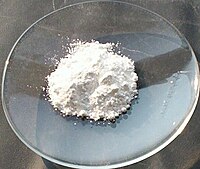
Photo from wikipedia
Chloride oxidation is a key industrial electrochemical process in chlorine-based chemical production and water treatment. Over the past few decades, dimensionally stable anode (DSA) consisting of RuO2 - and IrO2… Click to show full abstract
Chloride oxidation is a key industrial electrochemical process in chlorine-based chemical production and water treatment. Over the past few decades, dimensionally stable anode (DSA) consisting of RuO2 - and IrO2 -based mixed-metal oxides has been successfully commercialized in the electrochemical chloride oxidation industry. For a sustainable supply of anode materials, considerable efforts both from the scientific and industrial aspects for developing earth-abundant metal-based electrocatalysts have been made. This review first describes history of commercial DSA fabrication and strategies to improve their efficiency and stability. Important features related to the electrocatalytic performance for chloride oxidation and reaction mechanism are then summarized. From the perspective of sustainability, recent progress in the design and fabrication of noble-metal-free anode materials, as well as methods for evaluating the industrialization of novel electrocatalysts, are highlighted. Finally, future directions for developing highly efficient and stable electrocatalysts for industrial chloride oxidation are proposed. This article is protected by copyright. All rights reserved.
Journal Title: Advanced materials
Year Published: 2023
Link to full text (if available)
Share on Social Media: Sign Up to like & get
recommendations!